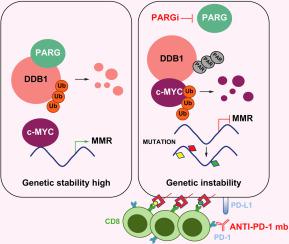Journal of Hepatology ( IF 26.8 ) Pub Date : 2022-02-12 , DOI: 10.1016/j.jhep.2022.01.026 Mincheng Yu 1 , Zheng Chen 1 , Qiang Zhou 1 , Bo Zhang 1 , Jinlong Huang 1 , Lei Jin 1 , Binghai Zhou 2 , Shuang Liu 3 , Jiuliang Yan 1 , Xiaoqiang Li 4 , Wentao Zhang 1 , Chunxiao Liu 5 , Bo Hu 1 , Peiyao Fu 1 , Chenhao Zhou 1 , Yongfeng Xu 1 , Yongsheng Xiao 1 , Jian Zhou 1 , Jia Fan 1 , Ning Ren 1, 6

|
Background & Aims
Although the treatment of hepatocellular carcinoma (HCC) has been revolutionized by the advent of effective systemic therapies, the prognosis of patients with HCC remains dismal. Herein, we examined the pathophysiological role of PARG and assessed the utility of targeting dePARylation for HCC therapy.
Methods
The oncogenic function of PARG was evaluated in 2 orthotopic xenograft models and a Pargflox/flox mice model. The therapeutic efficacy of PARG inhibitors in combination with an anti-PD-1 antibody were assessed in murine orthotopic models. Microarray analysis was used to evaluate the pathological relevance of the PARG/DDB1/c-Myc/MMR axis.
Results
High PARG expression was strongly associated with poor HCC prognosis. Hepatocyte-specific PARG deletion significantly impaired liver tumorigenesis. PARG promoted HCC growth and metastasis through DDB1-dependent modulation of c-Myc. Specifically, PARG dePARylated DDB1 and consequently promoted DDB1 autoubiquitination, thus stabilizing the c-Myc protein in HCC cells. PARG downregulation attenuated c-Myc-induced MMR expression and PARG deficiency was correlated with a favorable prognosis in patients with HCC treated with anti-PD-1-based immunotherapy. In addition, PARG inhibitors could act in synergy with anti-PD-1 antibodies in orthotopic mouse models.
Conclusions
PARG can act as an oncogene in HCC by modulating PARG/DDB1/c-Myc signaling and could be used as a biomarker to identify patients with HCC who may benefit from anti-PD-1 treatment. Our findings suggest that co-inhibition of PARG and PD-1 is an effective novel combination strategy for patients with HCC.
Lay summary
The increase in deaths due to hepatocellular carcinoma (HCC) is a growing concern, with the mechanisms responsible for HCC development still incompletely understood. Herein, we identify a novel mechanism by which the protein PARG contributes to HCC development. Inhibition of PARG increased the efficacy of anti-PD-1 therapy (a type of immunotherapy) in HCC. These findings support the future clinical development of PARG inhibitors, potentially in combination with anti-PD-1 inhibitors.
中文翻译:

PARG 抑制可限制 HCC 进展并增强免疫检查点治疗的功效
背景与目标
尽管肝细胞癌 (HCC) 的治疗已因有效的全身疗法的出现而发生了革命性变化,但 HCC 患者的预后仍然令人沮丧。在这里,我们检查了 PARG 的病理生理作用,并评估了靶向 dePARylation 在 HCC 治疗中的效用。
方法
在 2 个原位异种移植模型和一个Parg flox/flox小鼠模型中评估了 PARG 的致癌功能。在鼠原位模型中评估了 PARG 抑制剂与抗 PD-1 抗体组合的治疗效果。微阵列分析用于评估 PARG/DDB1/c-Myc/MMR 轴的病理相关性。
结果
高PARG表达与HCC预后不良密切相关。肝细胞特异性PARG缺失显着损害肝肿瘤发生。PARG 通过 DDB1 依赖性调节 c-Myc 促进 HCC 生长和转移。具体而言,PARG dePARylated DDB1 并因此促进 DDB1 自身泛素化,从而稳定 HCC 细胞中的 c-Myc 蛋白。PARG 下调减弱了 c-Myc 诱导的 MMR 表达,PARG 缺乏与接受基于抗 PD-1 的免疫治疗的 HCC 患者的良好预后相关。此外,PARG 抑制剂可以在原位小鼠模型中与抗 PD-1 抗体协同作用。
结论
PARG 可通过调节 PARG/DDB1/c-Myc 信号传导作为 HCC 中的癌基因,并可用作识别可能受益于抗 PD-1 治疗的 HCC 患者的生物标志物。我们的研究结果表明,PARG 和 PD-1 的共同抑制对于 HCC 患者是一种有效的新型联合策略。
总结
肝细胞癌 (HCC) 导致的死亡人数增加是一个日益令人担忧的问题,而导致 HCC 发展的机制仍不完全清楚。在这里,我们确定了蛋白质 PARG 有助于 HCC 发展的新机制。抑制 PARG 可提高抗 PD-1 疗法(一种免疫疗法)在 HCC 中的疗效。这些发现支持 PARG 抑制剂的未来临床开发,可能与抗 PD-1 抑制剂联合使用。




















































 京公网安备 11010802027423号
京公网安备 11010802027423号